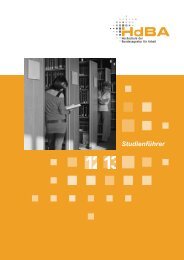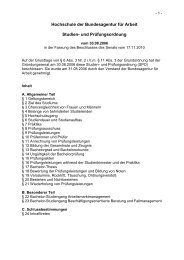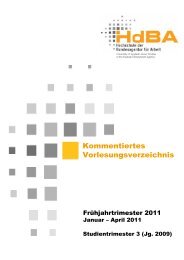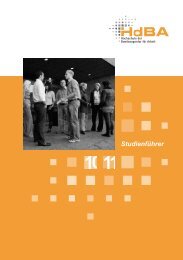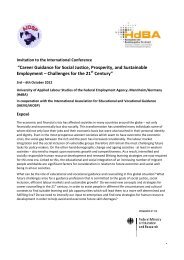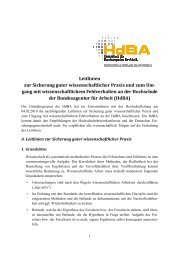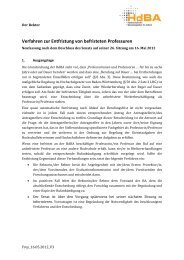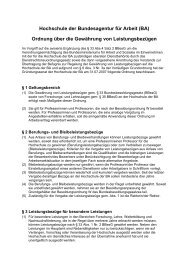Brain Drain - Hochschule der Bundesagentur für Arbeit
Brain Drain - Hochschule der Bundesagentur für Arbeit
Brain Drain - Hochschule der Bundesagentur für Arbeit
Create successful ePaper yourself
Turn your PDF publications into a flip-book with our unique Google optimized e-Paper software.
�����������������������������������������<br />
���������������������������������������������������������������������<br />
�<br />
�<br />
Overview<br />
When analyzing social effects of migration, one should first of all mention the issue of<br />
improving living conditions, which is a direct consequence of a pay rise and<br />
experience gained. In the majority of cases, social consequences of migration are<br />
positive. Collecting the initial capital enabling one to start an independent life,<br />
improve language skills, gain experience, all this improves the chances to succeed<br />
after returning to the country of origin. This assessment, however, may change in<br />
cases where migrant workers decide to settle down in a foreign country. The Irish<br />
example shows that, in the case of taking advantage of the EU membership,<br />
economic prosperity and the country’s active attitude, it is possible to persuade the<br />
citizens residing abroad to return to their country of origin and become an additional<br />
element of development in that country.<br />
Psychological effects of migration are not as positive as the economic ones, taking<br />
into consi<strong>der</strong>ation the consequences suffered by individual migrants and their<br />
families. A lot of research carried out to date reveals negative influences of migration<br />
on households. The ones mentioned most frequently are: negative effects on family<br />
life, educational difficulties in the bringing up of children, marital problems, divorce,<br />
burdening family members who are left behind. In addition there are usually<br />
excessive responsibilities, added stress, anxiety of the spouse, sometimes<br />
deterioration in the migrant’s health due to hard work abroad. As a consequence of<br />
occupational migration the traditional, patriarchal model of a family is in decline, there<br />
are changes in social roles. One person, usually the woman, is burdened with the<br />
responsibility of bringing up children and running the household. The bonds between<br />
children and parents can deteriorate rapidly. Occupational migration to a foreign<br />
country is often associated with feelings such as: loneliness, longing (both of the<br />
migrant and of the family members left at home) and there can exist a lack of sense<br />
of security. If we take into account basic human needs, failing to satisfy the most<br />
basic one, a sense of security, the psycho-social and emotional cost of international<br />
mobility proves to be very high. Human health (including mental health) is at this<br />
point in danger, irrespective of whether the migrants or members of their families<br />
back home are concerned.<br />
The courses are:<br />
Course 1: Selected theories of career development and counselling regarding the<br />
psycho-social effects of international mobility<br />
Course 2: Decision making models – Evidence and implications for international<br />
careers<br />
Course 3: The characteristics of international careers<br />
Course 4: Psychological separation of people working and living abroad<br />
105





